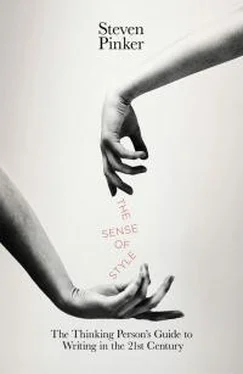Dear Abby: My wife sleeps in the raw. Beginning the obit with a bang, this sample column instantly brings a pang of nostalgia to the millions of readers who grew up reading Dear Abby, and graphically introduces her life’s work to those who did not. We see for ourselves, rather than having to be told about, the offbeat problems, the waggish replies, the (for her time) liberal sensibility.
Dear Abby: Our son married a girl when he was in the service. The deliberate use of surprising transitions—colons, dashes, block quotations—is one of the hallmarks of lively prose. 8A lesser writer might have introduced this with the plodding “Here is another example of a column by Mrs. Phillips,” but Fox interrupts her narration without warning to redirect our gaze to Phillips in her prime. A writer, like a cinematographer, manipulates the viewer’s perspective on an ongoing story, with the verbal equivalent of camera angles and quick cuts.
the marital, the medical, and sometimes both at once. Killjoy style manuals tell writers to avoid alliteration, but good prose is enlivened with moments of poetry, like this line with its pleasing meter and its impish pairing of marital and medical .
She was 90, though parts of her were considerably younger. A sly twist on the formulaic reporting and ponderous tone of conventional obituaries. We soon learn that Brown was a champion of women’s sexual self-definition, so we understand the innuendo about cosmetic surgery as good-natured rather than catty—as a joke that Brown herself would have enjoyed.
hauntingly, flinty, tart-tongued, weepy, hard-nosed, astringent, genteelly, risqué, voluptuous, titillating. In selecting these uncommon adjectives and adverbs, Fox defies two of the commonest advisories in the stylebooks: Write with nouns and verbs, not adjectives and adverbs, and Never use an uncommon, fancy word when a common, plain one will do.
But the rules are badly stated. It’s certainly true that a lot of turgid prose is stuffed with polysyllabic Latinisms ( cessation for end, eventuate in for cause ) and flabby adjectives ( is contributive to instead of contributes to, is determinative of instead of determines ). And showing off with fancy words you barely understand can make you look pompous and occasionally ridiculous. But a skilled writer can enliven and sometimes electrify her prose with the judicious insertion of a surprising word. According to studies of writing quality, a varied vocabulary and the use of unusual words are two of the features that distinguish sprightly prose from mush. 9
The best words not only pinpoint an idea better than any alternative but echo it in their sound and articulation, a phenomenon called phonesthetics, the feeling of sound. 10It’s no coincidence that haunting means “haunting” and tart means “tart,” rather than the other way around; just listen to your voice and sense your muscles as you articulate them. Voluptuous has a voluptuous give-and-take between the lips and the tongue, and titillating also gives the tongue a workout while titillating the ear with a coincidental but unignorable overlap with a naughty word. These associations make a sea of voluptuous models and titillating cover lines more lively than a sea of sexy models and provocative cover lines. And a sea of pulchritudinous models would have served as a lesson on how not to choose words: the ugly pulchritude sounds like the opposite of what it means, and it is one of those words that no one ever uses unless they are trying to show off.
But sometimes even show-off words can work. In her obituary of the journalist Mike McGrady, who masterminded a 1979 literary hoax in which a deliberately awful bodice ripper became an international bestseller, Fox wrote, “ Naked Came the Stranger was written by 25 Newsday journalists in an era when newsrooms were arguably more relaxed and inarguably more bibulous.” 11The playful bibulous, “tending to drink too much,” is related to beverage and imbibe and calls to mind babbling, bobbling, bubbling, and burbling. Readers who want to become writers should read with a dictionary at hand (several are available as smartphone apps), and writers should not hesitate to send their readers there if the word is dead-on in meaning, evocative in sound, and not so obscure that the reader will never see it again. (You can probably do without maieutic, propaedeutic, and subdoxastic. ) I write with a thesaurus, mindful of the advice I once read in a bicycle repair manual on how to squeeze a dent out of a rim with Vise-Grip pliers: “Do not get carried away with the destructive potential of this tool.”

From the early years of the twentieth century to well past its middle age, nearly every black family in the American South, which meant nearly every black family in America, had a decision to make. There were sharecroppers losing at settlement. Typists wanting to work in an office. Yard boys scared that a single gesture near the planter’s wife could leave them hanging from an oak tree. They were all stuck in a caste system as hard and unyielding as the red Georgia clay, and they each had a decision before them. In this, they were not unlike anyone who ever longed to cross the Atlantic or the Rio Grande.
It was during the First World War that a silent pilgrimage took its first steps within the borders of this country. The fever rose without warning or notice or much in the way of understanding by those outside its reach. It would not end until the 1970s and would set into motion changes in the North and South that no one, not even the people doing the leaving, could have imagined at the start of it or dreamed would take a lifetime to play out.
Historians would come to call it the Great Migration. It would become perhaps the biggest underreported story of the twentieth century. …
The actions of the people in this book were both universal and distinctly American. Their migration was a response to an economic and social structure not of their making. They did what humans have done for centuries when life became untenable—what the pilgrims did under the tyranny of British rule, what the Scotch-Irish did in Oklahoma when the land turned to dust, what the Irish did when there was nothing to eat, what the European Jews did during the spread of Nazism, what the landless in Russia, Italy, China, and elsewhere did when something better across the ocean called to them. What binds these stories together was the back-against-the-wall, reluctant yet hopeful search for something better, any place but where they were. They did what human beings looking for freedom, throughout history, have often done.
They left.
In The Warmth of Other Suns, the journalist Isabel Wilkerson ensured that the story of the Great Migration would be underreported no longer. 12Calling it “great” is no exaggeration. The movement of millions of African Americans from the Deep South to Northern cities set off the civil rights movement, redrew the urban landscape, rewrote the agenda of American politics and education, and transformed American culture and, with it, world culture.
Wilkerson not only rectifies the world’s ignorance about the Great Migration, but with twelve hundred interviews and crystalline prose she makes us understand it in its full human reality. We live in an era of social science, and have become accustomed to understanding the social world in terms of “forces,” “pressures,” “processes,” and “developments.” It is easy to forget that those “forces” are statistical summaries of the deeds of millions of men and women who act on their beliefs in pursuit of their desires. The habit of submerging the individual into abstractions can lead not only to bad science (it’s not as if the “social forces” obeyed Newton’s laws) but to dehumanization. We are apt to think, “I (and my kind) choose to do things for reasons; he (and his kind) are part of a social process.” This was a moral of Orwell’s essay “Politics and the English Language,” which warned against dehumanizing abstraction: “Millions of peasants are robbed of their farms and sent trudging along the roads with no more than they can carry: this is called transfer of population or rectification of frontiers .” With an allergy to abstraction and a phobia of cliché, Wilkerson trains a magnifying glass on the historical blob called “the Great Migration” and reveals the humanity of the people who compose it.
Читать дальше













